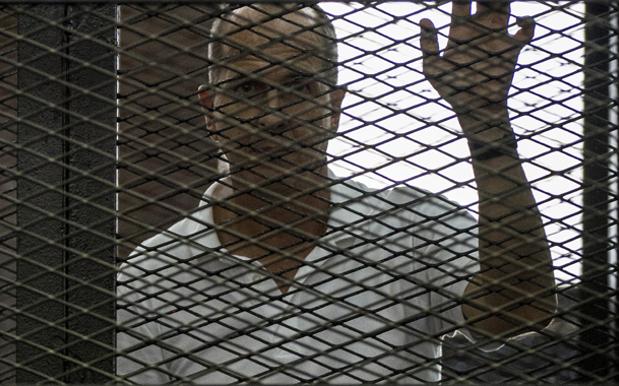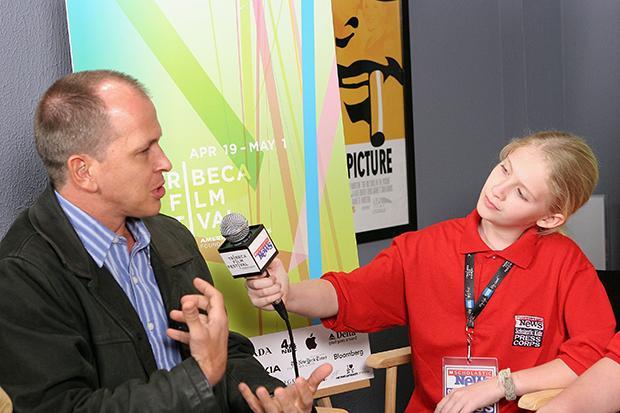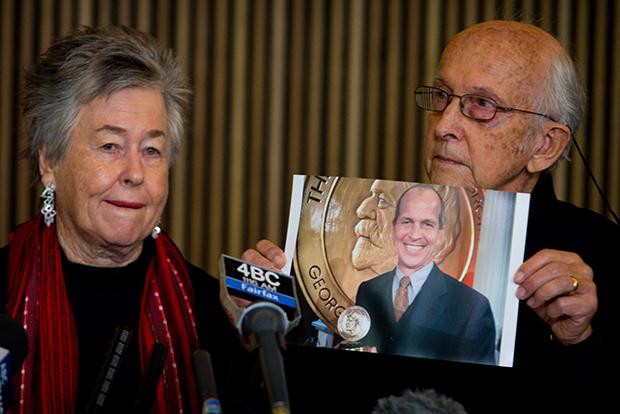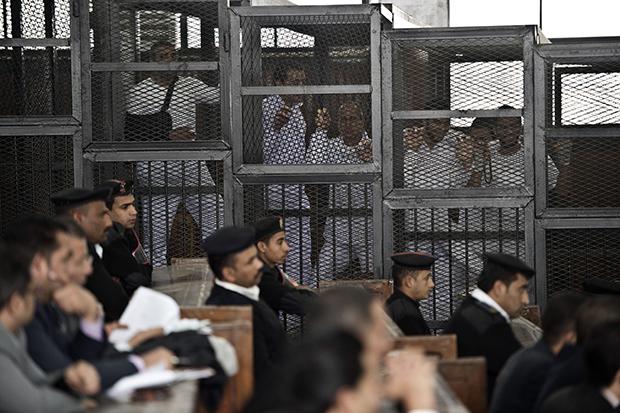
Over the past 12 hours, you’ve probably heard or seen a lot of instances of the name Peter Greste pop up in your news feeds. Greste is a journalist based in Egypt who the Egyptian government yesterday sent to jail for 7 years. The situation has sparked a massive uproar from the world’s media industries, with a lot of reporting on the topic containing extremely angry sentiments aimed towards the Egyptian Government. But who is Peter Greste? How did things get to the point where he was sent to jail in Egypt? And why is everyone so angry about that? We’ll explain the whole situation as best we can.
WHO IS PETER GRESTE?
Peter Greste is an Australian-born journalist and correspondent. He’s had a long and tenured career in the field, working for many prominent news organisations such as the BBC, Reuters and CNN in many war-torn and disputed regions of the world, including Bosnia, Mexico, Kenya, South Africa and Afghanistan. In 2011, Greste won a Peabody Award for his work on a documentary centring on Somalia entitled “Somalia: Land of Anarchy.”

Primarily, Greste was in Egypt operating as a correspondent for Al Jazeera English, covering the political turmoil that has engulfed the country in the wake of the June 2013 Revolution.
ALRIGHT. SO, WHY DID EGYPT SEND HIM TO JAIL?
On December 29 of last year, Egypt’s National Security Service raided a hotel in Cairo where a makeshift Al Jazeera bureau had been setup. Greste, along with Al Jazeera colleague Mohamad Fahmy were arrested and accused of news reporting that was damaging to national security. The accusations levelled at Greste claimed that he had produced false and misleading news reports that were aimed at denouncing the Egyptian Government whilst supporting the blacklisted Muslim Brotherhood – an organisation considered a terrorist outfit in Egypt. This, despite Greste maintaining complete innocence during the trial, at one point stating, “The idea that I could have any association with the Muslim Brotherhood is frankly preposterous.“
HOLD UP A SEC, WHO ARE THE MUSLIM BROTHERHOOD?
The Muslim Brotherhood is an Islamic organisation founded in Egypt in 1928. The group was initially a religious social organisation, but has since grown to spawn political parties as its size and influence grew. It routinely denounces violence and preaches the installation of Islamic nations. One such political party formed from the Muslim Brotherhood is known as the Freedom and Justice Party. In the 2012 Egyptian Presidential Elections, Mohamad Morsi of the Freedom Party won the Egyptian Presidency over secular independent Ahmed Shafik.
Morsi was sworn in on the 30th of June in 2012. Just on a year later, following severe public dissatisfaction and division regarding the Muslim Brotherhood, Morsi was overthrown and allegedly captured following ultimatums delivered by the Egyptian Military. Allegations of violence sanctioned by Morsi had arisen, and the continual tanking of the Egyptian economy were seen as catalyst reasons for the massive public uprising, which also had roots in religious and secular backgrounds given Morsi and the Brotherhood’s staunchly Islamic spines.
The Muslim Brotherhood is seen in Egypt as having strong links to Qatar, with which the country has a long-standing geopolitical conflict with. The Brotherhood has since been completely blacklisted in Egypt, with moves to stamp out its presence swift and brutal. The Brotherhood is regarded as a terrorist organisation in Egypt, as well as in Russia, Syria, Bahrain, Saudi Arabia, and the United Arab Emirates.
OK. WHAT THE HELL HAPPENED TO PETER GRESTE THEN?
Greste’s trial in Egypt has, on a number of occasions, been labeled a complete farce. Initially opened on February 21st, the first attempt at a trial had to be postponed as the court had not provided a translator for Greste. Following this first day of trial, Greste’s parents wrote an impassioned letter offering to take their son’s place, maintaining his journalistic integrity was of the highest standard.

Meanwhile, the acting President of Egypt at the time, Adly Mansour, wrote to Greste’s family promising to do all he could to resolve the case as quickly as possible. At this point the Australian Government officially became involved, with Foreign Minister Julie Bishop making contact with Egyptian deputy Foreign Minister Hatem Seif El-Nasr, stating that Australian interests are involved, and making it clear that the country does not support any effort to return democracy to Egypt that involves the suppression of media and prosecution of journalists.
In late March, Tony Abbott interjected, contacting interim President Mansour to support Greste, whilst maintaining sympathy towards the incumbent Egyptian government, which included intimating that Australia also views the Muslim Brotherhood as an organisation with links to terrorism.
In late April, with Greste now having spent over 100 days in an Egyptian prison, Prosecution in the case aired video and photographs to the court as evidence, despite the media having no connection with the case whatsoever. During this period, Greste’s requests for bail were repeatedly denied.

In late May, Foreign Minister Julie Bishop officially called on other Governments to aid Greste’s case, after growing public sentiment rallied behind him. In his ninth appearance in court following the arrest, defence lawyers for Greste now begin describing proceedings as completely farcical, with one photo in particular shown in court appearing to be clearly doctored.
On June 8, Abdel Fattah el-Sisi is sworn in as permanent Egyptian President.
On June 18, fellow Al Jazeera journalist Abdullah Elshamy was released from detention on health reasons, following an extended hunger strike in protest of his detention. Journalists worldwide began bracing for an imminent decision in the Greste case.
Yesterday, following six months in detention, Peter Greste was found guilty by the Egyptian court, and sentenced to seven years imprisonment for apparent journalistic ties to the Muslim Brotherhood.

WHY IS EVERYONE SO ANGRY ABOUT THIS?
Because journalists should not be persecuted for doing their job. In a free society, you cannot strike someone down for reporting on things that are actually happening, or for interviewing someone with an opinion that you don’t like. Global political leaders have all united in their unequivocal condemnation of the verdict.
US Secretary of State John Kerry was scathing in his criticism, “Today’s conviction and chilling, draconian sentences by the Cairo Criminal Court of three Al-Jazeera journalists and 15 others in a trial that lacked many fundamental norms of due process, is a deeply disturbing setback to Egypt’s transition.“
While Julie Bishop responded with shock, “The Australian government is shocked at the verdict in the Peter Greste case. We are deeply dismayed by the fact that a sentence has been imposed and we are appalled by the severity of it.“
The UK and Netherlands have both summoned their respective Egyptian Ambassadors to grill them over the situation, described by the UK Foreign Office as “unacceptable.”
Both Amnesty International and the United Nations Commissioner for Human Rights Navi Pillay have also condemned the decision, with Pillay stating, “It is not a crime to carry a camera, or to try to report various points of views about events. It is not a crime to criticise the authorities, or to interview people who hold unpopular views. Journalists and civil society members should not be arrested, prosecuted, beaten up or sacked for reporting on sensitive issues. They should not be shot for trying to report or film things we, the public, have a right to know are happening.“
It is a deeply shocking decision and one that should be met with universal condemnation.
WHERE DOES IT GO FROM HERE?
Greste does have a number of options for appeal. His family are considering lodging an appeal with Egypt’s Court of Cessation, as well as appealing directly to President al-Sisi for clemency. The Australian Government will continue diplomatic efforts to secure the release of Greste.
But no matter the case, it’s likely a positive outcome will not be seen for some considerable time. If at all.
Photo: Khaled Desouki, Thos Robinson, Patrick Hamilton, Simon Maina via Getty Images.



